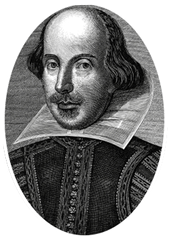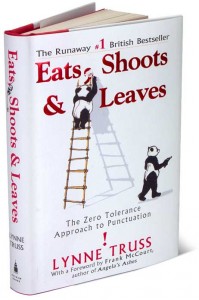From the Book Flap
In Eats, Shoots & Leaves, Lynne Truss dares to say that, with our system of punctuation patently endangered, it is time to look at our commas and semicolons and see them for the wonderful and necessary things they are. If there are only pedants left who care, then so be it. “Sticklers unite” is her rallying cry. “You will have nothing to lose but your sense of proportion – and arguably you didn’t have much of that to begin with.”
This book is for people who love punctuation and get upset about it. From the invention of the question mark in the time of Charlemagne to Sir Roger Casement “hanged on a comma”; from George Orwell shunning the semicolon to Peter Cook saying Nevil Shute’s three dots made him feel “all funny”, this book makes a powerful case for the preservation of a system of printing conventions that is much too subtle to be mucked about with.
An Excerpt
A Panda walks into a cafe. He orders a sandwich, eats it, then draws a gun and fires two shots in the air.
“Why?” asks the confused waiter, as the panda makes towards the exit. The panda produces a badly punctuated wildlife manual and tosses it over his shoulder.
“I’m a panda,” he says, at the door. “Look it up.”
The waiter turns to the relevant entry and, sure enough, finds an explanation.
“Panda. Large black-and-white bear-like mammal, native to China. Eats, shoots and leaves.”
So, punctuation really does matter, even if it is only occasionally a matter of life and death. This is a zero tolerance guide.
Note from the teacher: There are two versions of this book. You may read the British English edition or the American English edition. I used the British version here. Please note that punctuation marks like the commas are placed inside the quotation marks in American English.


Inner sticklers unite
Let’s eat Grandma or Let’s eat, Grandma.
Hmmm. Grammar does save lives.